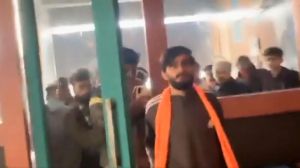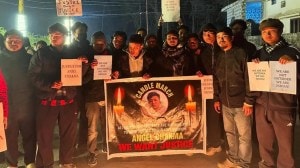BJP146;s Muslim act
To observers of the great Indian election drama, the BJP8217;s predicament vis-a-vis the Muslim community would seem enigma enveloped in co...

To observers of the great Indian election drama, the BJP8217;s predicament vis-a-vis the Muslim community would seem enigma enveloped in contradiction. The 2004 Lok Sabha poll campaign began with the ruling party eschewing divisive slogans, putting the Ram mandir and the Uniform Civil Code on the backburner 8212; or at least on low flame 8212; and focusing on economic well-being. Gujarat was explained as an aberration and, in sum, Muslims were told: To the BJP you8217;re as Indian as the next person, no better no worse. If India does well, so will you. Even the party8217;s Vision Document reflected this perception. It was an intriguing argument, given that it was the BJP that was making it and reflected a shift from the time that it wore its Hindutva as a badge of honour.
As processes evolve, they generally clarify. It is perhaps an iron law of Indian democracy that as politics evolves, it generally confuses. From a theoretical even-handedness, the BJP attitude to Muslims today appears a mix of desperation and disingenuousness. In some measure, this is result of the electoral battle having moved to Uttar Pradesh, an 80-seat behemoth where every fifth voter is a Muslim. For a start, the BJP is guilty of the very populism 8212; or tokenism 8212; it attacked the Congress for in the 8217;80s. Whether in summarily announcing 200,000 jobs for Urdu teachers or promising a financial package for madrassas, the BJP seems to have mastered the business of vote bank politics. Whether it will actually pay dividends it, of course, another matter. Next the BJP has courted individuals like the shahi imam of Delhi8217;s Jama Masjid, the sort of 8216;8216;leaders8217;8217; who lost credibility with the Muslim community a long time ago, whose career record has been one of staying on the right side of any government and serving only a personal cause. Finally, when a party-promoted Himayat Committee caravan 8212; carrying lesser known Muslim intellectuals 8212; set out in Lucknow to win votes for the BJP, it wrapped around itself huge portraits of Atal Behari Vajpayee and Pervez Musharraf. To thus equate the interests of Indian Muslims with peace with Pakistan is both unfair and unwarranted. It will disturb all Indians, not just Muslims.
The BJP will argue this is part of a calculated dual-track strategy. After all, Narendra Modi addresses meetings across UP even as others urge Muslims to trust the new, sop-friendly BJP. There is the argument that the BJP is only trying to ensure there is no Muslim consolidation at the constituency level. In UP, such 8216;8216;tactical voting8217;8217; is usually a reaction to an aggressive BJP campaign, one missing this time. All this may make for perfectly clever politics; but the BJP may want to ask itself if in being too clever by half it is convincing anybody at all.
- 01
- 02
- 03
- 04
- 05































